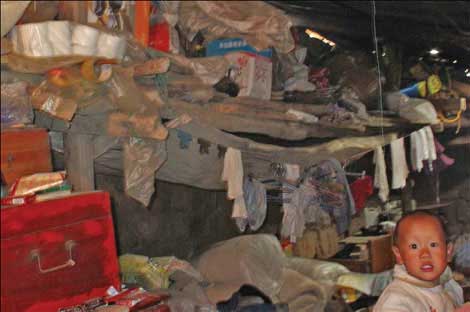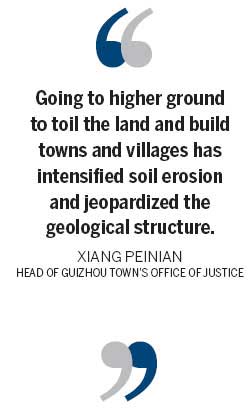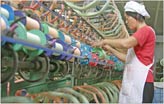Trouble in the gorges
Updated: 2011-06-03 11:11
By Hu Yinan (China Daily European Weekly)
 |
|
A child looks on in a shanty made by villagers in Zigui. Photos by Hu Yinan / China Daily |
Redistribution issues
For the resettled residents, most conflicts involve land redistribution, neighborhood disputes, and hostility between people who moved higher up the hill because of the dam and those who were asked to leave but didn't, said Xiang Peinian, head of the town's office of justice.
Take Wang, the grocery store manager, for example. Her family was supposed to relocate to Hubei's Shennongjia county. Their hukou (household registration) was transferred to Shennongjia in 1996, and they had to pay civil affairs authorities there 2,000 yuan for the transfer of each person's hukou.
 |
They still live in Guizhou but, with no local hukou, they cannot buy farmland.
"Now my father is dead. My three sisters and myself married away. Our old land is underwater. None of us have arable land in Shennongjia, where our hukou is, and none of us is entitled to any farmland here," Wang said.
About 5 percent of local disputes stem from cases similar to Wang's, said Xiang. Roughly 60 percent involve redistribution of farmland in the resettlement process.
Xiang, 51, also heads the people's mediation commission in Guizhou. Seven of 13 mediation sessions from April 13 to May 23, according to a logbook at Xiang's office, involved conflicts over farmland redistribution.
At a mediation session on May 23, Xiang tried to calm Liu Aimin, whose family had to buy subpar farmland - all that the original owners would offer - from another villager after their land was inundated. "As citizens, we should enjoy equal rights," Liu said.
"In many places," Xiang said, "the process of urbanization has been marked by farmers' exchange of land for a social safety net. But for those resettled because of the Three Gorges reservoir, this has been marked by farmers' exchange of land for the dam," Xiang said. "Everything had been taken away from them."
To resolve local conflicts, he said, "we ought to try to persuade the people. If it can't be done once, we'll do it twice, 10 times or 100 times if need be."
Expectations and petitions
On May 19, farmer Hu Jiahua and his wife, Xiong Minghong, arrived in Beijing to present a petition. The family is too poor to relocate, unable to apply for minimum living allowances, and has not been allocated a house site.
Financial constraints forced Hu's son to drop out of college last year. His daughter, a college junior, will have to do the same this summer.
On May 24, Xiang, the justice chief, rushed to Beijing to try to persuade Hu and Xiong to drop the petition and return home. (They arrived back in Hubei on Tuesday.) In many counties and towns, including Guizhou, officials' performance is measured by a system that deducts points if local folks take petitions to higher authorities, particularly to Beijing.
"The people have too high an expectation on us. But we're only the implementing body, not the decision-makers ... Efforts must be made to educate the people to not lose the tradition of self-reliance," said Huang Bin, deputy town chief in charge of resettlement affairs.
Ultimately, he believes, most local residents must be relocated again, even to other provinces, to expand their space of survival and protect nature in the vulnerable reservoir area.
Xiang agrees. "Going to higher ground to toil the land and build towns and villages has intensified soil erosion and jeopardized the geological structure," he said.
'Immense sacrifice'
Back in Xiangjiadian, the 19-year-old house of Li Yuxiu, 60, on the 177-meter line is fast crumbling. She and her husband, Wu Chengqiang, had to move out and seek shelter in a self-made shanty.
A meter above Li's crumbling house, Huan Gang, 27, has stayed on with his mother. Their house, too, is falling apart. "I don't know if this has anything to do with the dam. What I do know is this has been happening since the old county proper went underwater," Huan said.
Li's and Huan's families are candidates for the next round of resettlement. No schedule or plan has been fixed.
In a 2009 visit to resettled families in Chongqing, Vice-Premier Li Keqiang said the resettled residents "made immense sacrifice for the construction of the Three Gorges project", said a report by Xinhua News Agency.
"The Party and the State will never forget the contributions you made. We're bound to help you resettle well, find jobs, and get rich step by step," he told a group of resettled families.
E-paper

Pearl on the Yangtze
Wuxi is considered a town of natural beauty and its motto is "city of water and warmth".
Prose and consternation
Riding on a mystery train
Way of a warrior
Specials

Wealth of difference
Rich coastal areas offer contrasting ways of dealing with country's development

Seal of approval
The dying tradition of seal engraving has now become a UNIVERSITY major

Making perfect horse sense
Riding horses to work may be the clean, green answer to frustrated car owners in traffic-trapped cities
